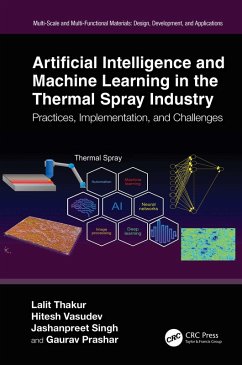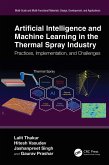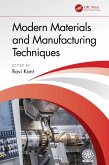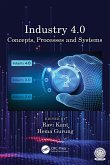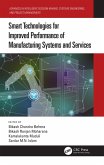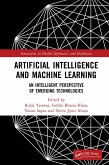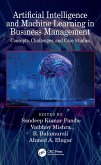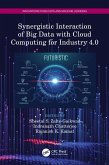Lalit Thakur, Hitesh Vasudev, Jashanpreet Singh, Gaurav Prashar
Artificial Intelligence and Machine Learning in the Thermal Spray Industry (eBook, ePUB)
Practices, Implementation, and Challenges
52,95 €
52,95 €
inkl. MwSt.
Sofort per Download lieferbar

26 °P sammeln
52,95 €
Als Download kaufen

52,95 €
inkl. MwSt.
Sofort per Download lieferbar

26 °P sammeln
Jetzt verschenken
Alle Infos zum eBook verschenken
52,95 €
inkl. MwSt.
Sofort per Download lieferbar
Alle Infos zum eBook verschenken

26 °P sammeln
Lalit Thakur, Hitesh Vasudev, Jashanpreet Singh, Gaurav Prashar
Artificial Intelligence and Machine Learning in the Thermal Spray Industry (eBook, ePUB)
Practices, Implementation, and Challenges
- Format: ePub
- Merkliste
- Auf die Merkliste
- Bewerten Bewerten
- Teilen
- Produkt teilen
- Produkterinnerung
- Produkterinnerung

Bitte loggen Sie sich zunächst in Ihr Kundenkonto ein oder registrieren Sie sich bei
bücher.de, um das eBook-Abo tolino select nutzen zu können.
Hier können Sie sich einloggen
Hier können Sie sich einloggen
Sie sind bereits eingeloggt. Klicken Sie auf 2. tolino select Abo, um fortzufahren.

Bitte loggen Sie sich zunächst in Ihr Kundenkonto ein oder registrieren Sie sich bei bücher.de, um das eBook-Abo tolino select nutzen zu können.
Artificial Intelligence and Machine Learning in the Thermal Spray Industry highlights how Artificial Intelligence and Machine Learning techniques are used in the Thermal Spray industry. It sheds light on AI's versatility and applicability in solving problems related to conventional simulation and numeric modeling techniques.
- Geräte: eReader
- mit Kopierschutz
- eBook Hilfe
Andere Kunden interessierten sich auch für
![Artificial Intelligence and Machine Learning in the Thermal Spray Industry (eBook, PDF) Artificial Intelligence and Machine Learning in the Thermal Spray Industry (eBook, PDF)]() Lalit ThakurArtificial Intelligence and Machine Learning in the Thermal Spray Industry (eBook, PDF)52,95 €
Lalit ThakurArtificial Intelligence and Machine Learning in the Thermal Spray Industry (eBook, PDF)52,95 €![Modern Materials and Manufacturing Techniques (eBook, ePUB) Modern Materials and Manufacturing Techniques (eBook, ePUB)]() Modern Materials and Manufacturing Techniques (eBook, ePUB)52,95 €
Modern Materials and Manufacturing Techniques (eBook, ePUB)52,95 €![Industry 4.0 (eBook, ePUB) Industry 4.0 (eBook, ePUB)]() Industry 4.0 (eBook, ePUB)52,95 €
Industry 4.0 (eBook, ePUB)52,95 €![Smart Technologies for Improved Performance of Manufacturing Systems and Services (eBook, ePUB) Smart Technologies for Improved Performance of Manufacturing Systems and Services (eBook, ePUB)]() Smart Technologies for Improved Performance of Manufacturing Systems and Services (eBook, ePUB)49,95 €
Smart Technologies for Improved Performance of Manufacturing Systems and Services (eBook, ePUB)49,95 €![Artificial Intelligence and Machine Learning (eBook, ePUB) Artificial Intelligence and Machine Learning (eBook, ePUB)]() Artificial Intelligence and Machine Learning (eBook, ePUB)52,95 €
Artificial Intelligence and Machine Learning (eBook, ePUB)52,95 €![Artificial Intelligence and Machine Learning in Business Management (eBook, ePUB) Artificial Intelligence and Machine Learning in Business Management (eBook, ePUB)]() Artificial Intelligence and Machine Learning in Business Management (eBook, ePUB)48,95 €
Artificial Intelligence and Machine Learning in Business Management (eBook, ePUB)48,95 €![Synergistic Interaction of Big Data with Cloud Computing for Industry 4.0 (eBook, ePUB) Synergistic Interaction of Big Data with Cloud Computing for Industry 4.0 (eBook, ePUB)]() Synergistic Interaction of Big Data with Cloud Computing for Industry 4.0 (eBook, ePUB)48,95 €
Synergistic Interaction of Big Data with Cloud Computing for Industry 4.0 (eBook, ePUB)48,95 €-
-
-
Artificial Intelligence and Machine Learning in the Thermal Spray Industry highlights how Artificial Intelligence and Machine Learning techniques are used in the Thermal Spray industry. It sheds light on AI's versatility and applicability in solving problems related to conventional simulation and numeric modeling techniques.
Dieser Download kann aus rechtlichen Gründen nur mit Rechnungsadresse in A, B, BG, CY, CZ, D, DK, EW, E, FIN, F, GR, HR, H, IRL, I, LT, L, LR, M, NL, PL, P, R, S, SLO, SK ausgeliefert werden.
Produktdetails
- Produktdetails
- Verlag: Taylor & Francis eBooks
- Seitenzahl: 138
- Erscheinungstermin: 1. Dezember 2023
- Englisch
- ISBN-13: 9781000996265
- Artikelnr.: 69121007
- Verlag: Taylor & Francis eBooks
- Seitenzahl: 138
- Erscheinungstermin: 1. Dezember 2023
- Englisch
- ISBN-13: 9781000996265
- Artikelnr.: 69121007
- Herstellerkennzeichnung Die Herstellerinformationen sind derzeit nicht verfügbar.
Dr. Lalit Thakur is currently working as an Assistant Professor in the Department of Mechanical Engineering at the National Institute of Technology (NIT) in Kurukshetra, India. He has obtained his M.Tech. (Welding Engineering) and Ph.D. degrees from the Indian Institute of Technology (I.I.T.) Roorkee, India. For the last 13 years, he is continuously exploring new possibilities in Welding Engineering and Thermal Spray Technology. He has guided many Ph.D. and Master candidates in the area of Welding and Thermal Spraying. He has authored more than 80 research publications in various international journals, books, and conferences of repute.
Prof. (Dr.) Hitesh Vasudev is working as a full-time Professor in the School of Mechanical Engineering and Division of Research and Development at Lovely Professional University, Jalandhar, India. He has received Ph.D. in Mechanical Engineering from Guru Nanak Dev Engineering College, India. His area of research is surface engineering, bimodal coatings, and additive manufacturing. He has more than 10 years of teaching and research experience. He has authored more than 100 research papers, and 3 books, and has organized International conferences.
Dr. Jashanpreet Singh is currently working at the University Centre of Research and Development, Chandigarh University as an Assistant Professor. He obtained his Ph.D. degree from the Thapar Institute of Engineering and Technology, Patiala in 2019. He has authored more than 55 research publications in various international journals (SCI/Scopus), books, and conferences of repute. He has a teaching experience of more than three years and industrial experience of more than two years. His area of research is tribology-solid particle erosion, thermal spray coatings, CFD simulation, artificial intelligence, machine learning and regression tools, process optimization, composites, and materials characterization.
Dr. Gaurav Prashar is an Associate Professor and Head of the Department of Mechanical Engineering, at Rayat Bahra Institute of Engineering and Nano-Technology, Hoshiarpur- India. His area of research is surface engineering and additive manufacturing. He has more than 15 years of teaching and research experience. He has authored more than 20 research papers (SCI/Scopus). The research outcomes have been published in reputed journals (SCI/Scopus) such as the Journal of Cleaner Production, Surface and Coatings Technology, Journal of Thermal Spray Technology, Engineering Failure Analysis, Surface Topography: Metrology and Properties.
Prof. (Dr.) Hitesh Vasudev is working as a full-time Professor in the School of Mechanical Engineering and Division of Research and Development at Lovely Professional University, Jalandhar, India. He has received Ph.D. in Mechanical Engineering from Guru Nanak Dev Engineering College, India. His area of research is surface engineering, bimodal coatings, and additive manufacturing. He has more than 10 years of teaching and research experience. He has authored more than 100 research papers, and 3 books, and has organized International conferences.
Dr. Jashanpreet Singh is currently working at the University Centre of Research and Development, Chandigarh University as an Assistant Professor. He obtained his Ph.D. degree from the Thapar Institute of Engineering and Technology, Patiala in 2019. He has authored more than 55 research publications in various international journals (SCI/Scopus), books, and conferences of repute. He has a teaching experience of more than three years and industrial experience of more than two years. His area of research is tribology-solid particle erosion, thermal spray coatings, CFD simulation, artificial intelligence, machine learning and regression tools, process optimization, composites, and materials characterization.
Dr. Gaurav Prashar is an Associate Professor and Head of the Department of Mechanical Engineering, at Rayat Bahra Institute of Engineering and Nano-Technology, Hoshiarpur- India. His area of research is surface engineering and additive manufacturing. He has more than 15 years of teaching and research experience. He has authored more than 20 research papers (SCI/Scopus). The research outcomes have been published in reputed journals (SCI/Scopus) such as the Journal of Cleaner Production, Surface and Coatings Technology, Journal of Thermal Spray Technology, Engineering Failure Analysis, Surface Topography: Metrology and Properties.
1. Artificial Intelligence in Thermal Spray Industry: Introduction and
Benefits. 2. Unsupervised and Supervised Machine Learning Techniques in
Wear Prediction. 3. Artificial Intelligence-Based Image Processing
Techniques for Assessment of Patterns and Mechanisms in Thermal Spray. 4.
Artificial Intelligence and Automation in Sustainable Development. 5. Role
of Machine Learning Techniques in Coating Process Monitoring, Controlling,
and Optimization. 6. Challenges of Using Artificial Intelligence in Thermal
Spray Industry: Implementation, Optimization, and Control. 7. Neural
Network Model for Wear Prediction of Coatings: Case Study. 8.
Implementation of Regression Modes for Wear Analysis of Coating: Case
Study.
Benefits. 2. Unsupervised and Supervised Machine Learning Techniques in
Wear Prediction. 3. Artificial Intelligence-Based Image Processing
Techniques for Assessment of Patterns and Mechanisms in Thermal Spray. 4.
Artificial Intelligence and Automation in Sustainable Development. 5. Role
of Machine Learning Techniques in Coating Process Monitoring, Controlling,
and Optimization. 6. Challenges of Using Artificial Intelligence in Thermal
Spray Industry: Implementation, Optimization, and Control. 7. Neural
Network Model for Wear Prediction of Coatings: Case Study. 8.
Implementation of Regression Modes for Wear Analysis of Coating: Case
Study.
1. Artificial Intelligence in Thermal Spray Industry: Introduction and
Benefits. 2. Unsupervised and Supervised Machine Learning Techniques in
Wear Prediction. 3. Artificial Intelligence-Based Image Processing
Techniques for Assessment of Patterns and Mechanisms in Thermal Spray. 4.
Artificial Intelligence and Automation in Sustainable Development. 5. Role
of Machine Learning Techniques in Coating Process Monitoring, Controlling,
and Optimization. 6. Challenges of Using Artificial Intelligence in Thermal
Spray Industry: Implementation, Optimization, and Control. 7. Neural
Network Model for Wear Prediction of Coatings: Case Study. 8.
Implementation of Regression Modes for Wear Analysis of Coating: Case
Study.
Benefits. 2. Unsupervised and Supervised Machine Learning Techniques in
Wear Prediction. 3. Artificial Intelligence-Based Image Processing
Techniques for Assessment of Patterns and Mechanisms in Thermal Spray. 4.
Artificial Intelligence and Automation in Sustainable Development. 5. Role
of Machine Learning Techniques in Coating Process Monitoring, Controlling,
and Optimization. 6. Challenges of Using Artificial Intelligence in Thermal
Spray Industry: Implementation, Optimization, and Control. 7. Neural
Network Model for Wear Prediction of Coatings: Case Study. 8.
Implementation of Regression Modes for Wear Analysis of Coating: Case
Study.
